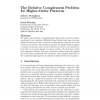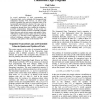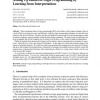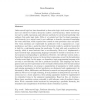662 search results - page 59 / 133 » Logic Programming with Ordered Disjunction |
AGP
1999
IEEE
14 years 1 months ago
1999
IEEE
We address the problem of complementing higher-order patterns without repetitions of free variables. Differently from the first-order case, the complement of a pattern cannot, in ...
AAAI
1994
13 years 10 months ago
1994
We describe a method for learning formulas in firstorder logic using a brute-force, smallest-first search. The method is exceedingly simple. It generates all irreducible well-form...
AAAI
2008
13 years 11 months ago
2008
In several applications of logic programming and Transaction Logic, such as, planning, trust management and independent Semantic Web Services, an action might produce incomplete f...
CORR
2000
Springer
13 years 8 months ago
2000
Springer
When comparing inductive logic programming (ILP) and attribute-value learning techniques, there is a trade-off between expressive power and efficiency. Inductive logic programming ...
AI
2004
Springer
13 years 8 months ago
2004
Springer
Order-sorted logic has been formalized as first-order logic with sorted terms where sorts are ordered to build a hierarchy (called a sort-hierarchy). These sorted logics lead to u...




